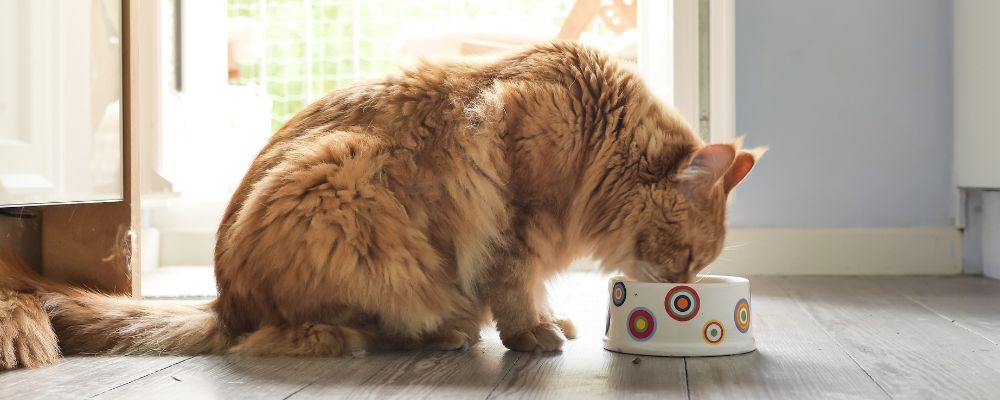Insurers define a “pre-existing condition” as any condition that has shown symptoms or been treated by a vet before acceptance of insurance cover, even when switching from another pet insurance company.
The good news is that if your cat does have a pre-existing condition, it is not too late to get pet insurance cover. You can either choose comprehensive cover such as the Ultimate360 or Essential plans with an exclusion on that condition (either temporary or permanent, depending on the condition & your vet history) or you can add a Benefit Booster to cover that pre-existing condition on these comprehensive plans.
You can now also choose MediPet’s limited, but exclusive LitePlus plan for pre-existing illness & accident cover for all ages, after the 30-day waiting period.
As a cat owner, understanding cat health conditions is crucial for providing the best care & cover possible. Health conditions can range from hereditary conditions, such as heart disease or Feline Lower Urinary Tract Disease (FLUTD), to chronic illnesses like diabetes, chronic kidney disease, or asthma that can affect your cat’s quality of life.
Understanding & identifying these conditions early on, helps manage their health & ensures your cat receives the necessary treatment & care. Our guide explores common health conditions in cats, their causes, symptoms, & how to manage them effectively.
Table of contents
- What Are Pre-Existing Conditions?
- How Health Conditions In Cats Are Identified
- Risks For Breed-Specific Health Conditions
- Managing Health Conditions In Cats
- Pet Insurance Considerations For Cats With Pre-Existing Conditions
- Routine Care – Preventative Care For Cats
- Final Thoughts on Health Conditions In Cats
What are Pre-Existing Conditions in Cats?
Pre-existing conditions are health issues or illnesses your cat has shown signs of, or been treated for, before a new insurance policy is activated, or when switching insurers. These conditions can significantly affect your cat’s overall health & require special care or ongoing management, as well as the insurance cover available to them.
Common cat conditions include kidney disease, diabetes, & cat chronic illnesses. In this guide, we will explore common cat health problems & discuss their causes, including hereditary conditions, cat genetic health risks, environmental factors, & age-related changes. Understanding these factors are vital for giving your cat the best care possible by choosing the right cat health insurance plan. For more insights on cat pet insurance plans for your cat, including pre-existing condition cover, view MediPet’s pet insurance plans.
Common Examples Of Pre-Existing Health Conditions In Cats
Some common cat diseases are chronic, such as kidney disease, & diabetes are frequently diagnosed in cats, especially as they grow older. These conditions often require long-term management to ensure that your cat remains comfortable & healthy. Kidney disease can lead to lethargy, loss of appetite, & increased thirst requiring cat kidney disease management.
Certain breeds are predisposed to specific conditions known as to hereditary conditions. For example, maine coons are at higher risk for hypertrophic cardiomyopathy, a heart condition, while brachycephalic breeds like Persians may develop respiratory issues due to their flat faces which is a genetic disorder in cats.
Past injuries, untreated illnesses, & conditions such as dental disease or infections may leave lasting effects on your cat’s health, further emphasising the need for early diagnosis, appropriate treatment & pet insurance cover.
Vet-designed cover ensures the best care. View MediPet’s veterinary plans for cats.
Causes & Contributing Factors To Pre-Existing Conditions In Cats
Hereditary conditions are predispositions due to pet breed that can play a significant role in the development of health conditions. Certain breeds are more prone to hereditary health problems, such as heart conditions, which are often congenital, or joint issues. For example, maine coons are predisposed to heart disease, while 1 in 3 cats are more likely to develop kidney disease, both of which are hereditary.
Lifestyle factors affecting cats include poor diet, lack of exercise, & exposure to toxins, which can also exacerbate potential health issues. Feline health risk factors such as obesity from poor diet raise the risk of diabetes & joint problems, while insufficient exercise weakens muscle tone & adds to weight gain.
Ageing cats & health issues go hand in hand as their bodies naturally deteriorate, making them more susceptible to conditions like arthritis, kidney disease, & diabetes.
How Health Conditions In Cats Are Identified
Recognising the signs of illness in cats early is crucial for effectively managing their health & improving your cat’s quality of life. While you may notice changes in your cat’s behaviour or activity levels, it’s your vet who can accurately diagnose any health concerns.
Your vet will assess your cat’s health by observing cat health symptoms, using diagnostic tools for cats such as blood tests or imaging, & reviewing the cat’s full medical history to get a comprehensive picture of their overall health. Early detection of these conditions helps ensure that your cat receives the necessary care before issues become more severe.
Observable Signs & Symptoms Of Pre-Existing Conditions In Cats
Physical symptoms such as vomiting, diarrhoea, changes in appetite or weight loss in cats are common indicators that your cat may need to see the vet. These signs should never be ignored, as they could point to underlying issues like kidney disease, diabetes, or gastrointestinal problems.
Cat behavioral changes like lethargy, aggression, excessive grooming, or withdrawal can signal underlying health issues. For example, urinary discomfort from bladder infections or blockages may manifest as frequent urination attempts, straining, urinating outside the litter box, excessive licking of the genital area, or reduced activity. These signs require veterinary care, as untreated urinary issues can lead to serious complications.
Diagnostic Tools & Processes: Discover How Cat Insurance Fits In
Veterinary exams for cats are essential for diagnosing health issues. Cat health screenings allow vets to assess your cat’s overall well-being & detect visible signs of illness in cats. However, many conditions require additional diagnostic tools, such as cat blood tests, feline ultrasound diagnostics, & other methods like X-rays or urine analysis. For certain chronic or breed-specific conditions, specialised tests like biopsies or cytology may be necessary..
For cats with pre-existing health conditions, having the right pet insurance cover is crucial. Diagnostics can be expensive, & many insurers either won’t cover the costs of these tests unless they provide a conclusive diagnosis, or they may apply sub-limits. Diagnostics don’t always lead to a diagnosis. MediPet covers diagnostic tests up to R5 000*. If your cat is lethargic & has a fever, all diagnostic tests related to those symptoms are covered, even if no specific diagnosis has been made, up to R72 000 on the most comprehensive plan, Ultimate360. Always check your pet insurance policy for cover details, particularly for those managing pre-existing conditions to ensure you’re comprehensively covered.
Understanding The Importance Of Medical histories
The importance of cat medical records is for identifying patterns in their health. Past illnesses, treatments, & injuries can contribute to their health today. Maintaining a detailed veterinary history in cats enables veterinarians to accurately diagnose current issues & develop a suitable treatment plan.
This also helps you choose the right cat insurance cover. This also enables you to choose the right pet insurance cover for your cat. Compare MediPet’s 5 pet insurance plans to suit your family’s needs & budget.
Risks For Breed-Specific Health Conditions
Certain cat breeds are more genetically predisposed to hereditary or common-breed conditions. For example, maine coons are prone to heart disease, while Persians are susceptible to respiratory problems due to their brachycephalic facial structure. Understanding these breed-specific risks helps you to be more proactive in managing your cat’s health.
Cat Breeds & Common Health Conditions
Understanding the specific health vulnerabilities of different cat breeds & genetic disorders, also known as hereditary conditions, is crucial for prospective owners to ensure proper care & early detection of potential health challenges. Recognising these risks can guide preventative care strategies & help owners make informed decisions when selecting a breed, & pet insurance cover without exclusions or long waiting periods.
For example, maine coons are prone to feline hypertrophic cardiomyopathy (HCM), a heart condition, while ragdolls are at higher risk for ragdoll kidney disease (PKD). Persians, with their distinctive flat faces, often face brachycephalic cat health risks, which can affect their breathing. Awareness of these breed-specific conditions allows for early intervention & proactive healthcare to help manage these hereditary conditions.
How To Mitigate Breed-Related Risks
Cat breed care tips involve understanding the health predispositions of your breed to provide effective care. Researching the potential health risks before adopting a cat helps owners develop targeted care plans, including breed-specific diets for cats, exercise routines, & medical monitoring.
Choosing to get pet insurance as soon as possible is a responsible decision for any pet owner. With MediPet, you can visit any vet in South Africa for tailored veterinary care.
Managing Health Conditions In Cats
Managing health conditions requires a holistic approach that includes proper feline nutrition, medical treatment, & lifestyle adjustments. This multifaceted care plan ensures your cat’s well-being & addresses their specific health needs. Incorporating cat health condition care & lifestyle tips into your pet’s routine can make a significant difference. For example, it is important to develop a winter safety plan to keep your cat comfortable & safe during the colder months.
Understanding Your Cat’s Nutrition & Dietary Needs
Proper nutrition is crucial for your pet’s condition. For example, cats with feline kidney disease may require a tailored diet, while obese cats may benefit from weight management formulas.
Consulting with your veterinarian helps ensure your cat receives the right nutrients to manage your cat’s condition. Regular monitoring of your cat’s appetite, weight, & overall health will also provide important clues as to whether the cat diet for chronic conditions is working effectively. Providing the right nutrition for sick cats can make a significant difference in their recovery & overall health.
Identifying Medical Treatments & Therapeutic Options
Personalised Benefit Booster treatment plans are helpful for cats with pre-existing conditions on your pet insurance cover. These plans may include cat medications for chronic issues, feline physical therapy, or surgical interventions tailored to the cat’s specific condition & overall health. For example, cats with arthritis may benefit from joint supplements & pain relief medications, while those with kidney disease might require fluid therapy or prescription diets.
In addition to conventional treatments, alternative holistic wellness therapies such as acupuncture or hydrotherapy can complement traditional approaches & enhance the quality of life for cats with ongoing health issues. These therapies may help manage pain, reduce inflammation, & improve mobility, making them valuable tools for holistic care. Vet-designed cover ensures the best care. View MediPet’s veterinary plans for cats.
Lifestyle Adjustments For Cats With Health Conditions
Creating a comfortable, cat-friendly environment setup is essential for cats with chronic conditions, especially those with mobility issues or chronic pain. Ensuring easy access to essentials like food, water, & litter boxes reduce stress & helps cats feel more secure in their surroundings.
Mental stimulation is also important. Regular, low impact play & activities can keep cats engaged & active, promoting emotional well-being. Feline mobility aids like ramps or soft bedding can further support physical comfort, while stress management in cats ensures they stay relaxed & happy despite their health challenges.
Pet Insurance Considerations For Cats With Pre-Existing Conditions
Obtaining pet insurance for cats with pre-existing conditions can be challenging, as many policies exclude cover for these health issues, or have year-long waiting periods. It’s critical to review pet insurance policy tips carefully to understand any exclusions & limitations before selecting a plan. Here is a pet insurance guide to provide peace of mind when considering pet insurance.
To overcome these challenges, consider policies that cover future, unrelated conditions or explore the most comprehensive cover – Ultimate360. This approach helps ensure your cat receives the best possible care while managing pre-existing conditions through a Benefit Booster add-on. Alternatively, MediPet’s LitePlus plan exclusively covers pre-existing conditions after just a 30-day waiting period – there is no cover like it in the market. View MediPet insurance options.
Pet Insurance Exclusions For Pre-Existing Conditions
Most pet insurance companies exclude cover for pets with pre-existing conditions, meaning illnesses or injuries diagnosed before the policy starts won’t be eligible for claims. This can make treatment for pre-existing health conditions more expensive, as you have to cover costs out-of-pocket.
It’s crucial to review pet insurance cover limits & the details of the cat insurance exclusions to ensure you fully understand what is & isn’t covered. This allows owners to make informed decisions when selecting a plan. Visit MediPet’s FAQ section. for clear explanations & support, as we offer more flexible solutions to help manage your cat’s healthcare expenses.
Tips For Finding Pet Insurance Cover Despite Pre-Exising Condition Limitations
When seeking pet insurance for a cat with pre-existing conditions, be cautious of cover that only offers partial cover, as your cat will not be adequately covered. To identify a limited cover, check the waiting periods, as some insurers have year-long waiting periods or exclude pre-existing conditions altogether, while others cover them only as a one-time treatment within the policy lifetime.
MediPet offers a unique approach, by providing flexible pet insurance plans that allow you to cover pre-existing conditions with a comprehensive plan, with an add-on Benefit Booster, or as soon as 30 days with the LitePlus limited accident & illness plan that covers pre-existing conditions.
Consider these pet insurance tips for cat owners to make an informed decision. For helpful guidance, compare MediPet’s Cat insurance comparison plans.
Evaluating Plans That Suit Special Needs
When selecting special needs pet insurance, cat owners should prioritise policies that offer comprehensive cover for future illnesses & accidents — even if pre-existing conditions are excluded — to cater for all other possibilities that could occur. It is crucial to assess factors such as waiting periods, sub-limits (treatment line-item limits on medication, surgery etc.) & excesses, as these can impact how your cat’s health needs & costs are covered.
Look for pet insurance cover that allows flexible add-ons, hereditary, pre-existing & chronic care cover, which can help you manage your cat’s health while staying within budget. For cats with specific health challenges, consider exploring MediPet’s LitePlus plan, which covers pets of all ages for immediate accident cover, as well as illness & pre-existing conditions after 30 days. This ensures care tailored to pets with special needs, allowing your cat to receive the care they deserve.
MediPet claim forms are completed & submitted online, learn about MediPet’s claim process here.
Routine Care – Preventative Care For Cats
Preventative care plays a crucial role in minimising the risk of health issues in cats. Regular vet visits, routine vaccinations, & early health screenings can help detect potential problems before they escalate, ensuring your cat’s well-being for their lifetime. With MediPet’s Routine Care add-on, pay as little as R65 per month for preventative care, with built-in savings of up to R960 per year (depending on the plan).
By incorporating regular health monitoring, making necessary environmental adjustments, & keeping up with routine vaccinations, you can actively support your cat’s health. In the following sections, we’ll dive into specific preventative measures that contribute to your cat’s overall wellness.
Regular Health Monitoring & Screening
Regular check-ups with a veterinarian are crucial for detecting early signs of health conditions or emerging health issues in cats. Annual vet visits help ensure that conditions like kidney disease, diabetes, & dental issues are caught early & managed effectively. Starting at age 7, cats should have a geriatric blood test to establish a baseline. Afterwards, semi-annual check-ups become essential to monitor health changes as they age.
At-home monitoring is equally important. Observing changes in your cat’s weight, appetite, behaviour, or litter box habits can provide early indicators of potential health concerns. If any unusual changes are noticed, it’s important to consult with a vet promptly to prevent complications. As cats age, specialised screenings, like kidney function tests or arthritis become more critical for timely treatment.
Environmental Adjustments To Minimise Risks
Creating a safe home for cats minimises health risks, especially for those with health conditions. Keep the indoor environment free of hazards like toxic plants or unsecured windows, which can cause accidents or stress. Adding multiple water points & litter boxes throughout the house can encourage hydration & reduce stress, especially for cats with health concerns. Reducing potential dangers ensures a safer, more relaxed space for your cat.
Maintaining cat hygiene tips, such as regularly washing bedding, cleaning litter boxes, & keeping feeding areas sanitary, is essential for reducing the risk of infections.
You can further improve the comfort of your home by adding mobility aids for cats, like ramps or padded beds, which can help cats with joint pain. To further reduce stress, limit external stressors like dogs or other cats that might cause anxiety.
Vaccination & Preventative Healthcare
Core cat vaccines, such as feline panleukopenia, feline herpesvirus, & calicivirus, are essential for protecting cats from life-threatening diseases. Timely boosters are crucial for maintaining immunity & ensuring long-term protection.
MediPet has 3 everyday routine care options from R65 per month for feline preventative care measures. This includes vaccinations, as well as flea & tick prevention in cats, & regular deworming to help address common health risks.
Dental care is crucial for cats. MediPet’s Ultimate360 plan has an exclusive dental benefit you can claim yearly for your dental needs.
Working with a veterinarian to develop a tailored cat health plan based on your cat’s age, lifestyle, & specific health needs ensure comprehensive, proactive care. This approach helps prevent illness & ensures your cat stays healthy & happy throughout life.
Final Thoughts on Pre-existing Conditions in Cats
Understanding, & managing health conditions in cats is crucial for maintaining their health & well-being. Proactive care, such as recognising symptoms early & tailoring treatments can significantly improve a cat’s quality of life.
Stay informed about your cat’s health needs & consult with veterinary professionals regularly. A well-rounded care plan that includes proper nutrition, a safe environment, & ongoing healthcare is essential for long-term well-being.
For expert guidance on pet insurance for pre-existing conditions, contact MediPet pet insurance for cats to explore options that help manage healthcare costs. Explore MediPet’s LitePlus Plan for pre-existing condition cover, or your options for our comprehensive pet insurance cover plans.
Source: *Please see MediPet’s policy wording for more information.









